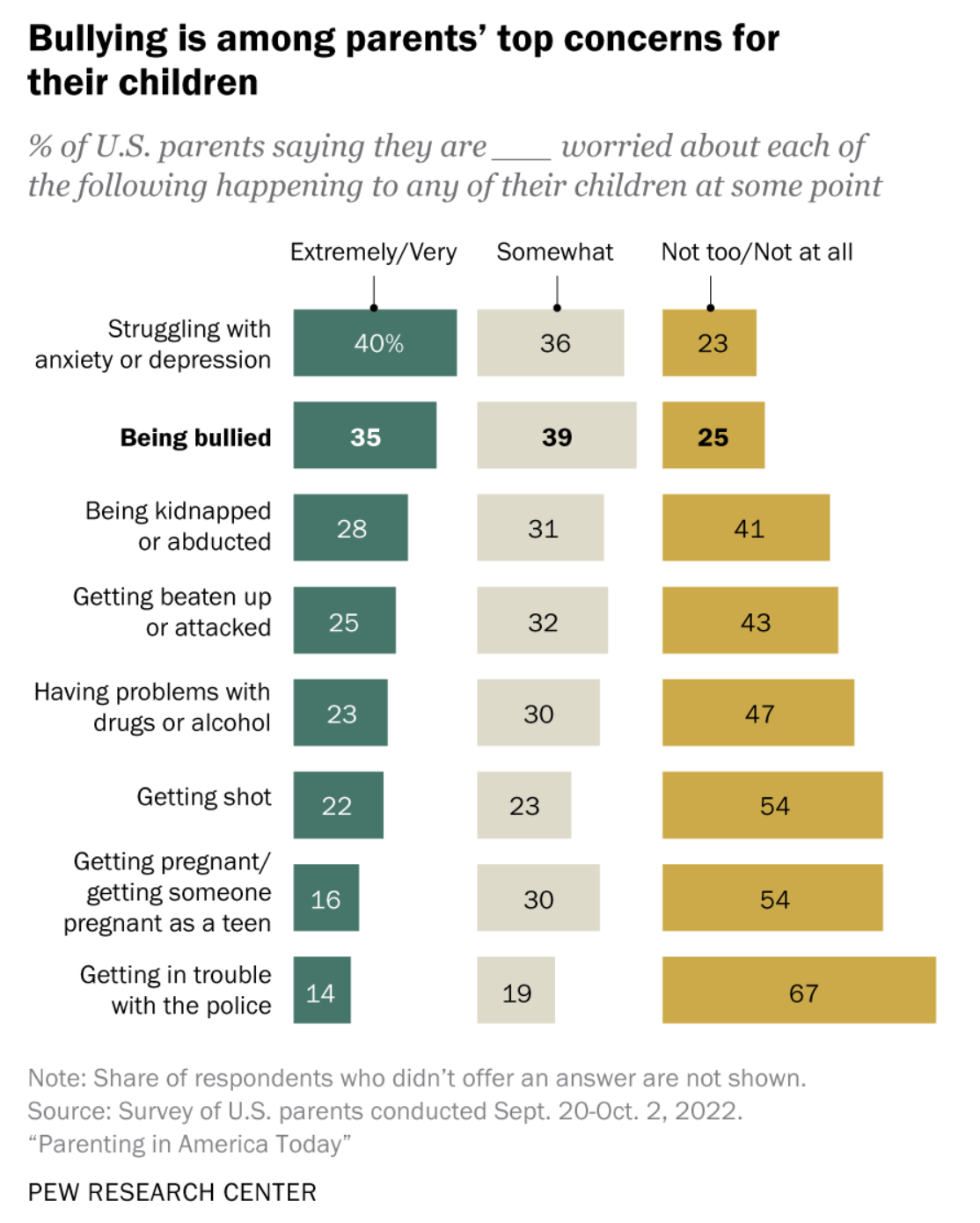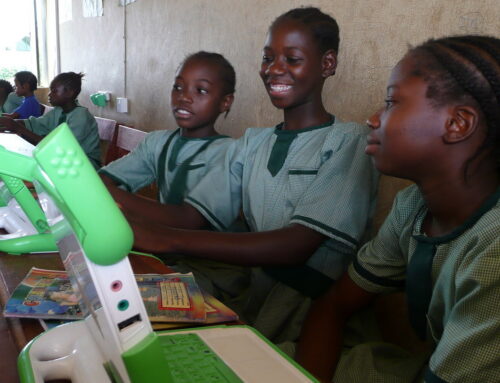Twenty years ago the number one concern of parents was their child’s academic success. This is no longer at the top of the list. This year’s Pew Survey of Parenting in America places bullying at number two. The only concern that ranked higher was concern about their children struggling with anxiety or depression – a reflection of the teenage mental health crisis that is in part driven by the impact of bullying and cyberbullying.
The Pew Survey makes for a fascinating read into what keeps parents up at night What you learn from digging deeper is that it is a rare parent who does not worry about their child being bullied. Over one-third of U.S. parents with children younger than 18 say they are extremely or very worried that their children might be bullied. Another 39% say they are somewhat worried about this. In other words only 25% of parents are not worried or too worried about their child being bullied.
Bullying is an even bigger concern for homeschooling parents
These headline figures mask significant variations between parents depending upon their cultural background, socioeconomic status, and individual family values. Some groups worry more about bullying than others.
A case in point is the growing number of parents who homeschool their children – which by the 2020 school year had increased to 3.7 million homeschooled students. A decade ago homeschooling was primarily driven by religious values and typically it was Christian parents who made this choice based upon their religious concerns. Last month’s Washington Post Schar School survey found that 58% of parents cite their fears about their child being bullied as a reason for homeschooling their child, alongside fear of school shootings and their anger with the perceived encroachment of politics into public schools. About 1 in 10 home-school parents volunteered that bullying was their number one main reason for homeschooling their child.
Why does it matter what parents think?
A list of parent fears might not seem particularly scientific. The reputation of fear is, afterall, to cloud our thinking and to take us away from informed reason. But parents – as the ultimate guardians for their child’s wellbeing – are closest to their children and as such are the best gauge of what is impacting their child and how we, as a society, are failing to support the wellbeing of our children.
If you work in education the concerns of parents are even more immediate. They are the decision makers when it comes to enrolling their children in your school. They are increasingly vocal that a school’s commitment to being bully free is a major determinant to their choice of school. And they are ferociously protective and in some cases litigious if a school fails their child in this regard.
What can parents do about bullying?
Navigating the delicate tightrope of fear requires us to delve deep into its roots, understanding what motivates our concerns. At Power of Zero, our engagement with schools and parents has provided valuable insights into the driving forces behind parental protectiveness. Parents, acutely aware of the peer violence and intolerance that peak in the middle school years, are apprehensive about the reptilian lack of care and cruelty that manifests online. The specter of bullying and cyberbullying looms large, carrying the potential for profound suffering, especially in a teenage world where suicidal thoughts are becoming distressingly common.
The decision to shield a child from these risks by withdrawing them from school is understandable. However, research suggests that this may not be the most effective long-term strategy for your child. Bullying is an unfortunate facet of life, extending its reach into workplaces, sports, and politics. As children grow, they need to learn the skills to navigate a world where bullying exists. The key lies in providing them with measured exposure to the world, coupled with ample opportunities to seek guidance and build resilience.
Understanding what bullying is really about
To truly empower your child against bullying, it is crucial to comprehend what it is really about. Bullying is fundamentally about power and dominance—a bid to get power over another individual. When a child faces bullying, the pivotal question arises: How can they get their power back?
I vividly recall a Middle School student whose eyes lit up when I presented him with this question. His initial response was to retaliate physically, but our subsequent conversation prompted an exploration of how superheroes retain power without resorting to aggression. His mantra became “if you hold your head up high no-one can take your power away” as a means of preserving his power and self-respect.
How will your child use their power?
Each child responds uniquely to the challenge of holding their power when confronted by bullying. The journey ahead of them involves discovering their own path, an expression of their agency in the world. Understanding that power is inherent in every relationship, along with affiliation or closeness, is a critical lesson for children. As parents and educators, our responsibility is to impart the skills necessary for children to wield their power adeptly, standing up for themselves and others without resorting to bullying, aggression, or violence—a principle that underpins Power of Zero’s mission.
The Superpowers Program, designed by Power of Zero, is rooted in building core life skills such as resilience, critical thinking, and effective responses to bullying. Initially crafted for kindergarten, the program is now expanding to cater to elementary school students, fostering a generation equipped to face the complexities of the world with confidence.
Approach your child’s school as an ally
It is important to approach your child’s school as your ally. While most schools now have anti-bullying policies, the reality is that 90% of incidents of bullying occur under the radar. Teachers may well not know the full extent of what your child is suffering. Communicate your concerns in writing and maintain an email record of any bullying that your child experiences. Inquire about the school’s interventions for how they respond to bullying and persist in seeking a resolution. Remember, your school is duty-bound to provide a bully-free learning environment, and escalating concerns up the school’s chain of command is an option if needed.
Introducing the No Bully Program can be a transformative step. Despite schools’ commitments to preventing bullying, many have never been trained in an effective system for how to prevent bullying and to respond to the incidents that still occur.The No Bully program, with two decades of success, offers a methodology rooted in student empathy that resolves 90% of bullying incidents. Educators, after a day-long training, can implement these strategies to turn around bullying situations and reintegrate children into their peer groups.
For schools facing challenges in their anti-bullying efforts, the No Bully program stands ready to provide the necessary training and support. By fostering empathy and effective practices, we can collectively strive towards creating bully-free learning environments for every child.







Leave A Comment